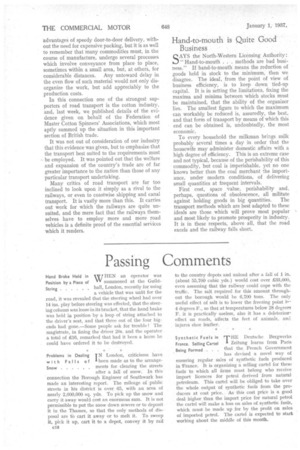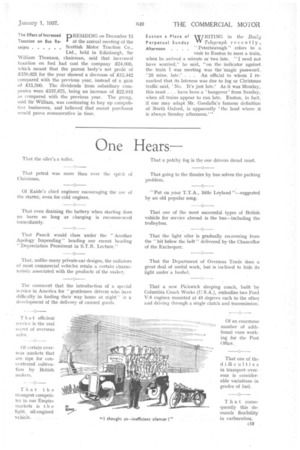Passing Comments
Page 68

Page 69

If you've noticed an error in this article please click here to report it so we can fix it.
Hand Brake Held in W HEN an operator was Position by a Piece of summoned at the Guild String hall, London, recently for using a vehicle that was unfit for the road, it was revealed that the steering wheel had over 14 ins, play before steering was effected, that the steering column was loose in its bracket, that the hand brake was held in position by a loop of string attached to the driver's seat, and that three out of the four big ends had gone.—Some people ask for trouble l The magistrate, in fining the driver 20s. and the operator a total of £16, remarked that had it been a horse he could have ordered it to be destroyed.
Problems in Dealing N London, criticisma have with Falls of I been made as to the arrange Snow merits for clearing the streets
after a fall of snow. In this connection the Borough Engineer of Southwark has made an interesting report. The mileage of public streets in his district is over 65, with an area of nearly 2,000,000 sq. yds. To pick up the snow and carry it away would cost an enormous sum. It is not permissible to put the snow down sewers or to deposit it in the Thames, so that the only methods of dis• posal are to cart it away or to melt it. To sweep it, pick it up, cart it to a depot, convey it by rail c18
to the country depots and unload after a fall of 1 in. (about 55,700 cubic yds.) would cost over £33,000, even assuming that the railway could cope with the traffic. The salt required for this amount throughout the borough would be 6,700 tons. The only useful effect of salt is to lower the freezing point 4 degrees F., so that at temperatures below 28 deg-rcel F. it is practically useless, also it has a cleleterioueffect on roads, affects the feet of animals, an ii. injures shoe leather.
THE Deutsche Bergwerks Zeitung learns from Paris that the French Government has devised a novel way of ensuring regular sales of synthetic fuels produced in France. It is organizing a selling cartel for these fuels to which all firms must belong who receive import licences for petrol derived from natural petroleum. This cartel will be obliged to take over the whole output of synthetic fuels from the producers at cost price. As this cost price is a good deal higher than the import price for natural petrol the cartel will make a loss on sales of synthetic fuels, which must be made up for by the profit on sales of imported petrol. The cartel is expected to start working about the middle of this month.
Synthetic Fuels in France. Selling Cartel Being Formed . .
The Effect of Increased Taxation on Bus Receipts . . . „ . . PRESIDING on December 15 at the annual meeting of the Scottish Motor Traction Co., Ltd., held in Edinburgh, Sir William Thomson, chairman, said that increased taxation on fuel had cost the company £24,000, which meant that the parent body's net profit of ;€159,623 for the year showed a decrease of £12,442 compared with the previous year, instead of a gain of £11,500. The dividends from subsidiary companies were i137,675, being an increase of £22,913 as c:ompared with the previous year. The group, said Sir William, was continuing to buy up competitive businesses, and believed that recent purchases would prove remunerative in time, Euston a Place of WRITING in the Daily Perpetual Sunday Telegraph recently,
Afternoon . . . " Peterborough " refers to a visit to Euston to meet a train, when he arrived a minute or two late. "I need not have worried," he said, " on the • indicator against the train I was meeting was the 'magic password. 20 mins. late.' . . . An official to whom I remarked that its lateness was due to fog or Christmas traffic said, 'No. It's just late.' As it was Monday, this must. . . have been a ' hangover ' from Sunday, when all trains appear to run late. Euston, in fact, if one may adapt Mr. Guedalla's famous definition of North Oxford, is apparently the land where it is always Sunday afternoon.'"




























































































































































